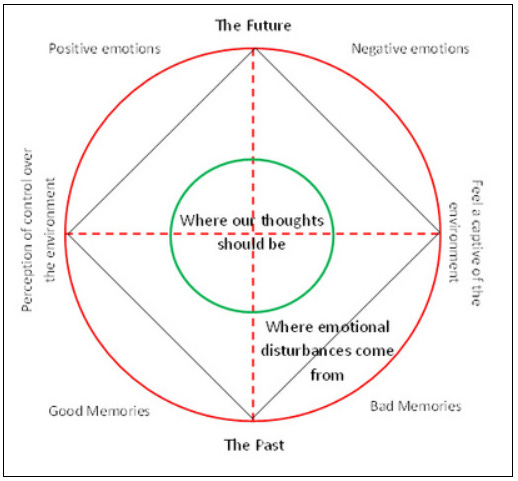So many people are pre-occupied with looking for ways to maintain a youthful appearance, it has become a major industry. Diet, exercise, special cosmetics, and those magical pills that will bring the sparkle of youth back to you have become the order of the day.
The most potent secret to youth is in our own mind. Guess what - it's all connected to our emotions.
Our emotions are usually not directly conscious to us, yet they drive our thoughts and behavior. Emotions trigger memories and memories trigger emotions, thoughts, desires, ambitions, perceptions, feelings, and our very happiness.
Emotions are part of us, we host them, entertain them, listen to them, and act on them. They influence our irritability, rationality, predictability, our creativity and most importantly, our very sense of self. They come from deep inside us and influence all our dreams, fantasies, and other imagined aspects of our lives.
Think about it, we are governed by complex emotions like loyalty, sympathy, pride, confidence, achievement, embarrassment, indignation, bewilderment, pity, elation, satisfaction, boredom, shame, disgust, frustration, and surprise, etc. These emotions create our existential realities about how we see the world. Emotions decide what we like, dislike, what is agreeable, disagreeable, giving meaning to our world.
Emotions play a major part in developing our self concept about who we are. Think about it, “I” and “me” is actually made up of emotions and feelings about who we are. This is where stress is inbuilt into us, with different sets of emotions are related to different levels of awareness. And here comes the cost. At each level of our self awareness comes sets of emotions that cause all the stress, anxieties, and fears which age us.
At our primal level we are concerned about our basic physiological needs. Our awareness is physical and immediate, concerned about now. Associated with our primal self are the basic emotions concerned about survival, physical fulfillment and enjoyment. The material level is concerned with pleasure, comfort, and the avoidance of pain. The primal self suppresses our basic anxieties and stresses, which show up as ageing.
The boundaries of a person are metaphorically extended by the things we own. The social self is very much based in feelings of one’s position in relation to others. Empathy exists at this level and our emotions are concerned with belongingness. The ego self is the most common domain where we are concerned about ‘how we see ourselves’ and ‘how others see us’. The ego self is about glorifying ourselves. This level of awareness leads to very sophisticated coping mechanisms to deal with realities that don’t fit in with our world view. Not satisfying our expectations is another source of stress and ageing.
The spiritual self enables us to attach different sets of values to “I’ and “me”, where people begin to feel integrated with the world around them. At this level self esteem comes from doing what a person feels is right, and where a person may be willing to sacrifice their interests for the interests of something greater than themselves. People who are able to reach this level within themselves tend to live a low stress life.
At this higher level people can transcend their basic emotions of excitement, fear, anger, and anxiety, and will be aware of their defense mechanisms that operate at the ego level.
One is immersed within their own sea of emotional orientation with each level of awareness differently influencing perception and thought. Within the lower continuums people’s streams of thought tend to be negatively based where fear manifests itself in worry, anger, judgment, and general anxiety, leading to generally pessimistic narrative. Pessimistic narratives aren't good for ageing.
At the spiritual level there is little negative narrative on the part of the person.
Our view of the world is filtered through emotions. We tend to see through a past or future orientation. Our thinking is swayed by our time orientation within an emotion matrix pictured below. Any past orientation will be full of stories which influence our sense of meaning about the present. Some of the stories we remember will be full of regret for past mistakes, disappointment for what was not done, or full of satisfaction and/or pride for what was achieved. Under such a scenario we live in continual stress from disappointment. This is a major factor causing ageing.
The past influences our interpretation of the present. Positive and negative experiences influence what we perceive, contemplate and put our focus upon in the now. The positive and negative memories of the past also guide our direction in the future. Positive memories guide us towards action where we have a high sense of control over the events around us, and negative memories tend to make us averse to taking action where we have a low sense of control of events around us.
The future represents our positive hopes and aspirations, or negative fears and anxieties where positive emotions may lead to a sense of high self confidence, and become powerful motivators for action, while negative emotions may lead to sense of low self confidence, where we may take an averse attitude towards action.
Extreme feelings of low or high self confidence can lead to either reckless overconfidence in a positive emotional state or an aversion from action out of fear and anxiety in a negative emotional state. The same feelings are not uniform across the all activities, where a person may feel a high sense of self efficacy in some areas and low sense of self efficacy in other areas.
There is a strong nexus between our experiences, experience and emotion. We see the world through the perspective of our own identity shaped by our emotions.
The interaction of experience and emotion leads to the formation of our beliefs, which lay the foundation of our values and aspirations, which guide our feelings and thinking.
The above dynamics fuels our imagination which translates our memory, into beliefs, aspirations, and emotions into scenarios that create feelings of self efficacy, motivation, energy, and drive.
Our optimal position for minimizing stress is within the present orientation where the influence of future fears and hopes, past disappointments and successes are lowest. Too much past or future orientation may lead to personal delusion such as unrealistic hopes, or massive overconfidence.
Alternatively too much future or past orientation may lead to undue pessimism where the feeling of self confidence and motivation is low, leading to states of anxiety and inaction. Orientation in the past will anchor one into previous patterns of success, which promote rigidity, while too much orientation into the future may lead to fantasy, thus leading to unrealistic objectives, another source of stress
The impact of our past and future orientation and sense of self efficacy upon our behavior is strong, which can lead us into unnecessary stressful paths of action.
This must be managed by living in the 'here and now'. If we can stop thinking about past disappointments, or future hopes, we can relive massive amounts of stress upon our mind, and minimize the adverse affects upon our body.
This may sound too simple, but by simply enjoying every moment we have now without thinking of what has already happened or what might happen will bring a large relief to your body. In fact, worrying about the past, can change it, and worrying about something in the future is most often thinking about something that actually may not even happen.
Most stress we create for ourselves is unnecessary and ages us fast. Just by simply keeping your mind in the present will do so much good for your health and this will show up in the age you look. Just look at Hillary Clinton's before and after pictures.
Originally published in Ovi Magazine 13th July 2013
Click on subscribe so articles can be directly emailed to your inbox:






